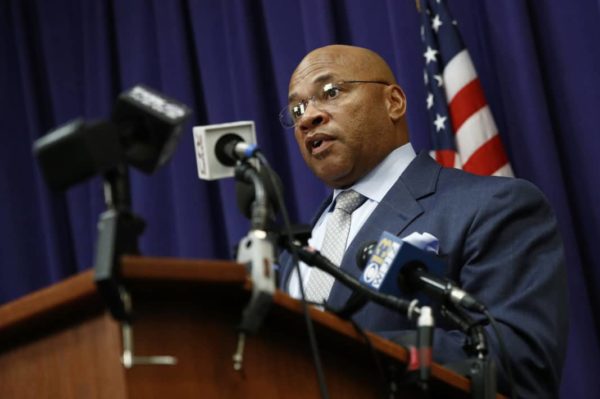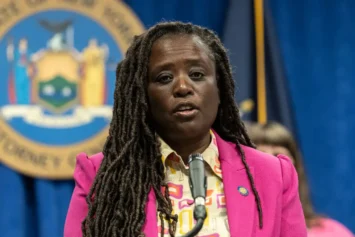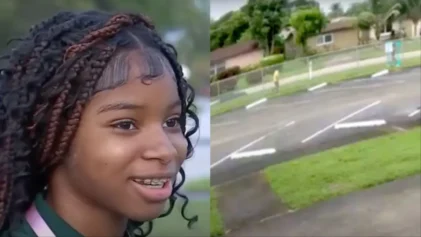
Baltimore Police Department Interim Commissioner Gary Tuggle addresses the resignation of an officer who was recorded repeatedly punching a man during a news conference at the department’s headquarters, Monday, Aug. 13, 2018, in Baltimore. (AP Photo/Patrick Semansky)
BALTIMORE (AP) — A Baltimore police officer recorded while repeatedly punching a man in a street confrontation has resigned, and investigators are looking at charging him with second-degree assault, Interim Police Commissioner Gary Tuggle said Monday.
Tuggle said at a news conference that the officer’s use of “repeated head strikes” and attempts to take the man to the ground were “disturbing.” The officer’s actions were not acceptable, even if they were sparked by emotions, because an officer shouldn’t act on them, Tuggle added.
“We’re trained to act in a non-emotional way,” Tuggle said, adding that if an officer crosses the line, there needs to be intervention from a peer or a supervisor.
The video recorded Saturday begins with the officer standing in front of a black man who has his back to a wall. The officer, who is also black, can be seen shoving the man in the chest before the officer starts throwing punches. The man tries to block punches from the officer but doesn’t appear to fight back. The man is pushed over some steps by the officer who continues to throw punches, and the video ends with the officer on top of him.
Body camera video from the two officers on the scene is consistent with video circulating online, Tuggle said.
Attorney Warren Brown said his client, 26-year-old Dashawn McGrier, was the man being punched in the video. McGrier was hospitalized Saturday and wasn’t charged, he said. At a news conference, Brown said McGrier suffered a fractured jaw and fractured ribs, as well as ringing in his ear and swelling on his face.
Brown described the incident as “a tremendous setback in our effort to build a desired relationship between the community and law enforcement.” Brown also said it was fortunate his client didn’t suffer greater injury. He noted the unrest in the city that happened after the death of Freddie Gray, a young black man who was fatally injured while in the custody of officers in 2015.
“He easily could have had his temple hit the corner of one of those steps, his skull be fractured, and we would be on the verge of another Freddie Gray,” Brown said.
A second officer who was present Saturday has been assigned to administrative duties during the investigation. Tuggle said the second officer had a duty to contain the situation and keep himself safe.
Tuggle didn’t name the officer since he resigned Sunday. But Brown identified the officer seen punching his client on video as Arthur Williams. McGrier is fighting charges for allegedly assaulting Williams in June.
Williams’ statement of probable cause from the June 26 arrest says he was on patrol when he noticed a woman with a cigar with possible marijuana. As he got closer, he wrote, he smelled marijuana and attempted to stop her to write a citation. But McGrier grabbed the suspected marijuana and fled.
Williams wrote that he stopped him, and McGrier “took a fighting stance.” He wrote that he called for backup because he knew that McGrier “had a history of fighting with police officers and resisting arrest.”
McGrier then tried to hit him and run, but Williams tackled him, Williams wrote. McGrier then started inciting the crowd to attack him, he wrote. Williams pulled out his gun “on the low ready” after he heard someone in the crowd suggest going after Williams since he was only one officer, he wrote.
He wrote that he pointed his Taser at McGrier’s torso because he was attempting to hit him. He put him in handcuffs and McGrier “stated several times that he would kill this officer once he was released from prison,” he wrote. His body camera was knocked off twice, he wrote.
Tuggle noted Monday that no complaint was filed after that arrest in June.
Brown said Williams and McGrier had a history even before the June incident. In the spring, he said McGrier had suggested to some youths that they talk to their parents about how Williams had treated them.
“And from that point on, he directed his ire toward my client,” Brown said.
Baltimore entered a federal consent decree last year after federal investigators detailed longstanding patterns of unconstitutional policing, racial profiling and excessive force. Federal authorities began investigating city police after Gray’s death in 2015. In Baltimore’s case, the agreement mandates changes in the most fundamental aspects of daily police work, including use of force, searches and arrests.
The officer was hired in May 2017, Tuggle said, but he stressed that officers in the academy receive consent decree training and all other training is consistent with the consent decree.


